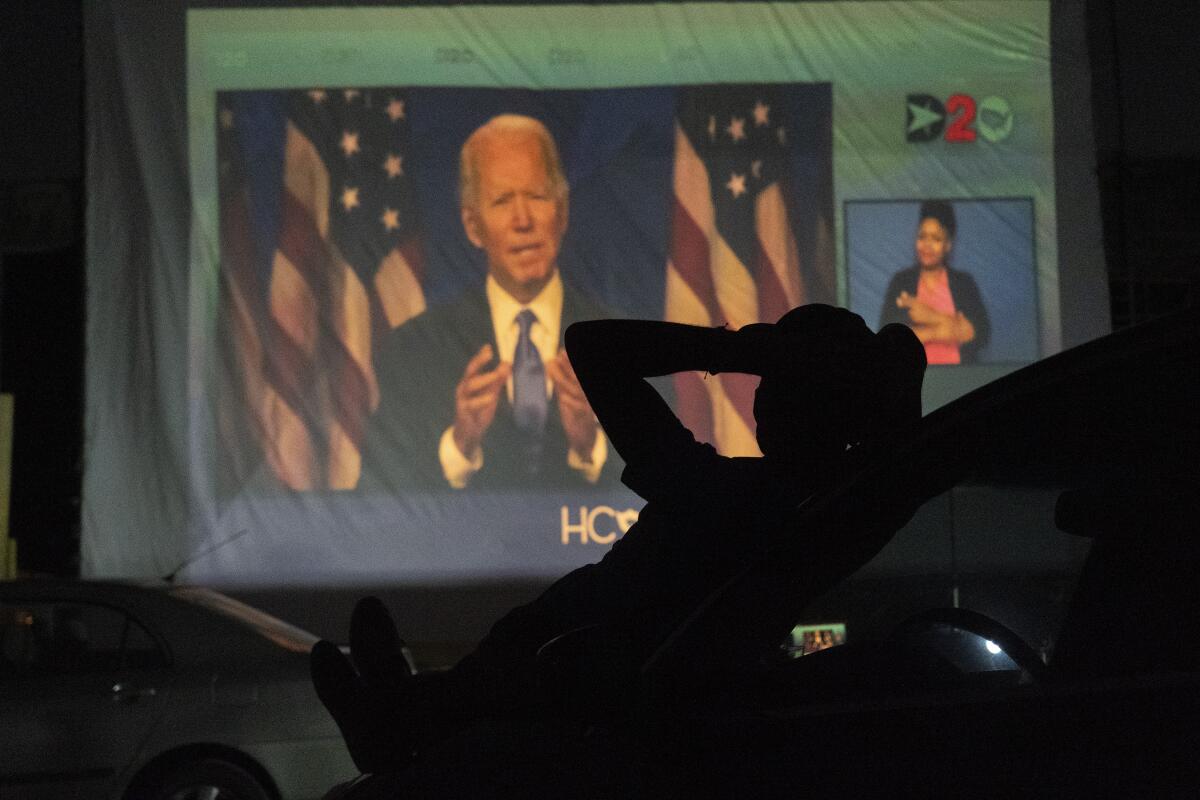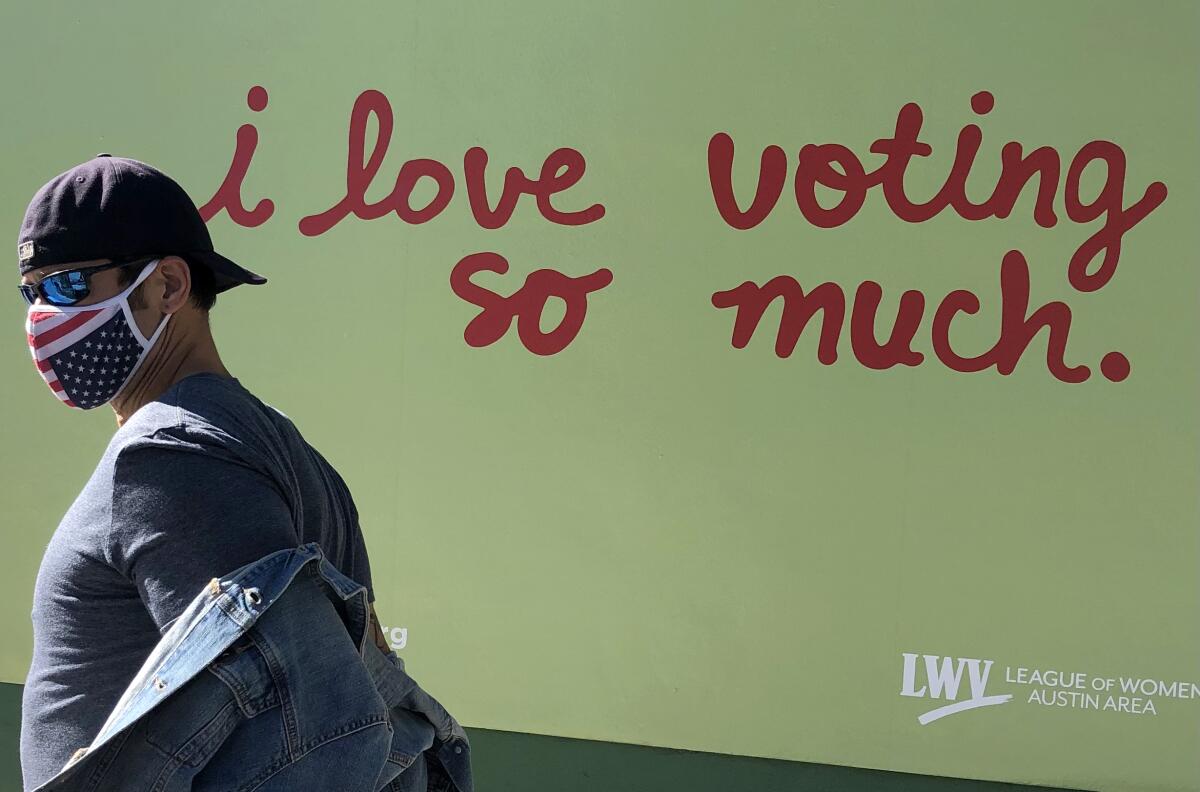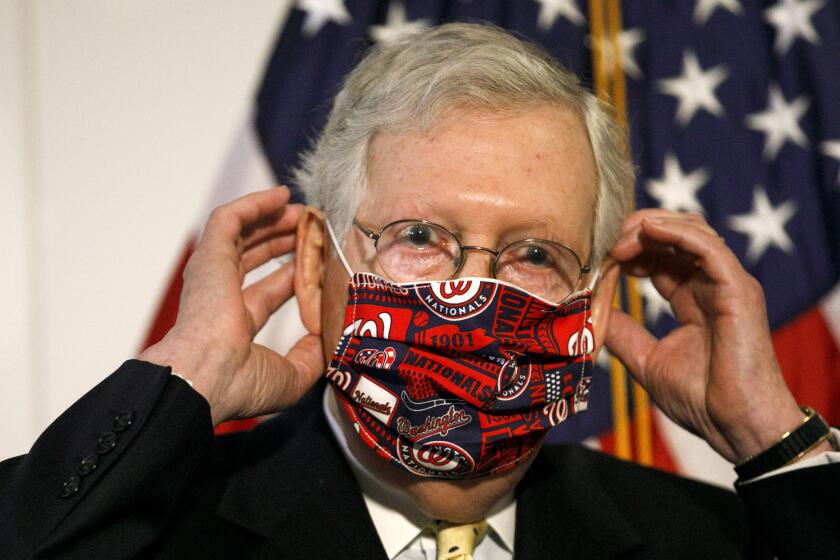Democrats believe Trump has put Texas in play. A Biden win could be a game-changer

- Share via
AUSTIN, Texas — For years it shimmered on the far horizon, beckoning like a watery mirage: a blue Texas.
Democrats plotted and schemed and talked about flipping this conservative stronghold and seizing its electoral votes, a stockpile that is crucial for Republicans. Inevitably, they fell short — typically by a lot.
This time, however, it is not far-fetched to think Joe Biden could carry the Lone Star State, a sign of the difficult straits facing President Trump and the growing opportunities for cash-rich Democrats aiming not just to win the White House but take control of the Senate and expand their House majority.
Biden remains a distinct underdog. Democrats have not won a statewide race in more than 20 years, and their last presidential candidate to carry Texas was Jimmy Carter, in 1976.
“It’s not become probable,” Jim Henson, who co-directs the University of Texas/Texas Tribune Polls, said of Biden’s chances. “But it’s gone into the realm of the plausible.”

Recently the Biden campaign announced a $6-million television ad buy — not huge in a state with 17 major media markets — and dispatched his wife, Jill, to get-out-the-vote rallies in Dallas, El Paso and Houston.
That’s hardly a full-on assault. Still, the fact Biden hasn’t written Texas off entirely reflects his advantage heading into the final stretch of the campaign. With a steady lead in states he must win, the former vice president can reach for others less vital to his chances, including Georgia, Iowa and Ohio.
Biden doesn’t need Texas’ 38 electoral votes to claim the White House; Trump does. If the state flipped — and stayed Democratic in years to come, a far more difficult challenge — it would reshape the national political landscape like nothing since California turned blue nearly 30 years ago. Any Republican running for president would start at a huge disadvantage.
Even a close Biden finish would mean the GOP could no longer take Texas for granted, said Garry Mauro, a former state land commissioner and Democratic Party leader. “That means they couldn’t spend as much money in Iowa and Ohio,” Mauro said.
Several circumstances have converged to give Biden a shot. Four years ago, Hillary Clinton lost by 9 percentage points. But Texas is growing and changing, as hundreds of thousands of transplants arrive and bring their political inclinations from California, New York and other left-leaning states.
Kathleen Neilson, who moved last year from Brooklyn, N.Y., was among those casting an early ballot for Biden on Wednesday at a busy community center near downtown Houston.
“He would be way more presidential than Donald Trump,” said the 36-year-old law student, who described herself as “super-duper liberal.”
Latinos, who tend to vote Democratic, are gaining strength in the state. (Since 2018, the number of Latinos in Texas has grown nine times faster than the white population; Latinos now account for more than 11.5 million of the state’s nearly 29 million residents.)

“We know the risk of losing democracy,” said Paloma Diaz, 56, a director of Latin American studies at the University of Texas in Austin. She grew up in Chile under the dictatorship of Augusto Pinochet and sees the same impulses in Trump. “We are going straight to a totalitarian government,” she said.
A number of hard-fought contests up and down the ballot — for the U.S. Senate and House and the Texas Legislature — also help Biden, producing a geyser of campaign contributions that fortify a Democratic ground operation built over years of increased competition. The Biden campaign is piggybacking on those turnout efforts.
“You are seeing the needle move in recent elections,” said Rebecca Acuña, who directs Biden’s Texas campaign. “We’re going to have record turnout this year.... We’re gonna have more than 10 million voters.”
Perhaps most important are the candidates themselves. Biden, a relative centrist by Democratic Party standards, has broader appeal and faces less hostility than Clinton did in 2016. Trump, who holds a narrow lead in Texas polls, has grown less popular.
For Lance Pierce, the president’s boorish behavior in last month’s debate was more than he could stand.
Pierce likes Trump’s position on trade and China, and his selection of federal Judge Amy Coney Barrett for the Supreme Court. “Short-term in my world, and in most of the corporate Republican world, Trump is the better answer,” said Pierce, a staunch conservative who works in the software industry.
“But you get to the point where you just say, ‘I cannot. I cannot just hold my nose,’” Pierce continued. “I just feel bad my party couldn’t put a better candidate in front of us.”

Pierce, 62, is like a lot of his neighbors in Keller, a tony suburb in the Dallas-Fort Worth metroplex. Under Trump, the suburbs — home to significant numbers of college-educated, politically moderate voters — have become a huge reservoir of Democratic support, adding to the party’s traditional edge in the big cities.
In the sprawling suburbs alone, Democrats flipped two Republican-held congressional seats in 2018 and are eyeing several more this year.
Outside the state’s metropolitan areas, however, the politics change almost as abruptly as the scenery.
East of Austin, the liberal-leaning state capital, steel and glass towers give way to rolling fields and faded red barns adorned with pro-Trump placards and banners flapping in the breeze created by passing 18-wheelers.
In La Grange, home to the brothel that inspired “The Best Little Whorehouse in Texas” movie and musical, the owner of a classic-car showroom parked two single-prop planes: a red one, poised for takeoff, says “Trump Express” on its side; behind it, a white plane — its nose and shattered propeller digging into the ground — is stenciled with anti-Biden slogans.

“The trends are bluish, no question,” said David Beckwith, a Republican strategist who worked for the Bush family in several campaigns. “But Texas is still a conservative state.”
The area around La Grange is part of the 10th Congressional District, a slice of the Hill Country once represented by Lyndon B. Johnson but now held by the GOP. It sprawls from Austin to the rural edges of Houston, where Albert Cheng, 50, an engineer, land surveyor and director of Texas Latino Conservatives, plans to vote again for the president.
A second-generation Mexican American, Cheng likes Trump’s stances on abortion, school choice, guns, Israel and immigration, which, he says, resonate in Texas despite the rough edges of the president’s personality.
“I understand the frustration in this and I tell [others], ‘You know, as upset as you are about Trump, I’m that much upset with the Democrats and how they treat my issues,’” Cheng said.
Paul Saldaña, 54, who runs a public relations firm in Austin, believes the election is about more than issues. “First and foremost we need to return morality to the nation,” he said of his support for Biden.
Saldaña is also motivated by Trump’s cavalier handling of the COVID-19 pandemic. For the last several months, Saldaña has volunteered with local caregivers and seen firsthand how the deadly virus has torn through the Latino community. “That is a direct reflection of the failure of the federal government,” he said. “It’s personal for me.”
If Trump weren’t running, it is difficult to imagine Texas being nearly as competitive as it is today. That raises the question of whether a Democratic victory would constitute a true and lasting shift, or merely amount to the repudiation of an unpopular incumbent and his handling of the pandemic and attendant economic crisis.
With a growing likelihood of Joe Biden winning, Republican candidates have begun to step away from Trump, urging voters to elect them as a check on the Democrat.
“If Joe Biden somehow won ... there will be declarations of Texas’ blueness from sea to shining sea,” said Henson, who runs the Texas Politics Project at the University of Texas in Austin. That, he said, would be premature.
A meaningful test will come in 2022, when the governorship and other statewide offices are on the ballot. If Democrats end their decades-long losing streak, it could better position them for the next presidential contest.
That, in turn, might improve the chances of showing in 2024 that Biden winning Texas was no fluke.
Barabak reported from San Francisco and Baxter from Austin, Texas. Times staff writer Molly Hennessy-Fiske in Houston contributed to this report.
More to Read
Get the L.A. Times Politics newsletter
Deeply reported insights into legislation, politics and policy from Sacramento, Washington and beyond. In your inbox three times per week.
You may occasionally receive promotional content from the Los Angeles Times.













